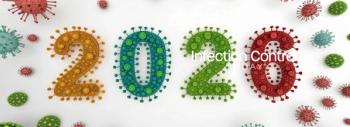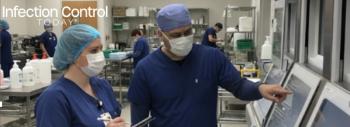
Sterile Processing: Where We are Now and What Lies Ahead
By Damien S. Berg, BA, BS, CRCST
With the 60-year anniversary of the International Association of Healthcare Central Service Materiel Management (IAHCSMM) upon us, and the start of my IAHCSMM presidency commencing in May, I can’t help but reflect on all the positive changes that have impacted the profession and IAHCSMM over the years, as well as stay focused on some of the challenges that remain.
Now, more than ever, I am proud, resolved and determined to continue the path laid out before me by many great sterile processing professionals, leaders and industry changers. We have seen and experienced all the greatness that sterile processing offers and, along with that, have witnessed some notable challenges and obstacles. In keeping with IAHCSMM’s longstanding tradition, we will continue to meet those challenges head-on, and deliver the very best support and services to the many dedicated individuals worldwide who comprise this noble and critically-important profession. We have so many possibilities lying before us, and I know I speak for the rest of IAHCSMM’s leadership when I say we are eager to tap and embrace them for the betterment of our association, the profession and, most importantly, the customers and patients we serve.
I have seen the pride and dedication of our members, and we as a profession are seeing a positive shift in the recognition of our profession, including the hard work and diligent adherence to standards, processes and practices in our departments every day. There is a growing understanding and appreciation for what our profession entails and how it not only impacts the hospital’s financial bottom line, but patient safety and quality outcomes as well.
We are stronger now more than ever in our history and I’m confident that, together, we will tackle the challenges affecting our vital discipline. Some of those challenges relate to staffing, budgeting, instrumentation/technology (some of whose sophistication and intricate designs make effective, thorough cleaning and, therefore, sterilization, a struggle), interdepartmental communication shortcomings, and the need for targeted, ongoing continuing education to ensure those responsible for instrument reprocessing are well equipped to manage their critically-important tasks, consistently and diligently, each and every day, and for each and every case. We must stay committed to following best practices and ensuring we have at our disposal the latest industry standards and guidelines, as well as manufacturers’ instructions for use (IFU), and we must ensure that we truly work as dedicated professionals with an eye on quality and safety.
As a sterile processing veteran, I’m often asked about the “next” challenges for the profession and how I envision the future of sterile processing; my answers are quite complex. Despite recent gains in recognition of the importance of sterile processing as it relates to patient care, more work still needs to be done. This is true in the context of training, education, technology, staffing and recognition for our technicians and the collective profession.
While this seems like a very long, complex list, it is our charge in the modern sterilization world to tackle these challenges and opportunities head-on and with a clear and deliberate path. I believe the foundational elements and direction of this path lies in standards-making, professionalism, and targeted advocacy efforts.
Understanding and actively participating in the processes that impact our profession and day-to-day lives is key. Sitting back while important decisions are made and then figuring out how to implement them is not the proactive or thoughtful approach our profession’s needs. There is a warranted calling for evidence-based, scientific facts and principles – balanced by experience of what is feasible in practice – to produce the next generation of standards, and there needs to be a solid understanding of how to implement and sustain these practices. Only through study and participation will we gain a better foothold on this ever-changing and challenging profession. As professionals, we can also contribute to our profession by becoming more active within IAHCSMM, attending the national annual conference & expo, and participating in local IAHCSMM chapters. Educational and networking opportunities abound, and they play a critical role in knowledge advancement and sharing of information – both of which have a direct impact on one’s personal success and the delivery of safe, quality patient care.
Advocacy is equally important, and this is another key focus of IAHCSMM. Advocacy entails support, calling out and participating in something for the greater cause, and this involves more than just standards development and training. Successful advocacy means being the constant voice for our profession and establishing one cohesive voice for modern sterile processing, both inside and outside of the department. As individuals, we must ask ourselves: Am I participating? Am I truly advocating? If we can’t answer those questions with a definitive “yes,” we must commit to doing so. This will help our profession take on the challenges that lie ahead, and allow us to become an active part of the solution that will see us deliver true quality and reproducible patient care through outstanding service.
In 2018 and beyond, IAHCSMM will remain steadfastly committed to providing exemplary support and creating a stronger profession through education, certification and advocacy offerings, and through a keen focus on the profession’s evolving needs and challenges. My motto as IAHCSMM president is “Together, we are strong.” IAHCSMM is working hard, but we need every professional responsible for device reprocessing to heed the call for enhanced professionalism and patient safety by becoming more committed to continuing education, certification, networking and advocacy. Patient lives depend on us and quality healthcare simply cannot occur without us.
Damien S. Berg, BA, BS, CRCST, is IAHCSMM’s president-elect (assuming presidency in May 2018), and serves as sterile processing manager at St. Anthony Hospital in Lakewood, Colo.
Newsletter
Stay prepared and protected with Infection Control Today's newsletter, delivering essential updates, best practices, and expert insights for infection preventionists.




